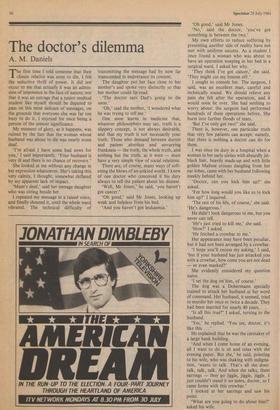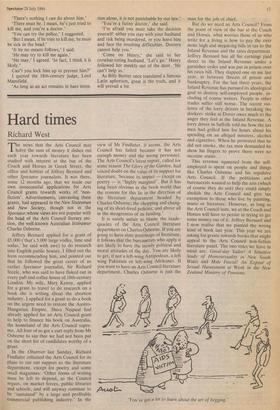The doctor's dilemma
A. M. Daniels
The first time I told someone that their closest relative was soon to die, I felt the seductive thrill of power. It did not occur to me that actually it was an admis- sion of impotence in the face of nature; nor that it was an outrage that a junior medical student like myself should be deputed to pass on this most delicate of messages, on the grounds that everyone else was far too busy to do it. I enjoyed for once being a person of the utmost significance.
My moment of glory, as it happens, was ruined by the fact that the woman whose husband was about to die was nearly stone deaf.
`I'm afraid I have some bad news for you,' I said importantly. 'Your husband is very ill and there is no chance of recovery.'
She looked at me without any change in her expression whatsoever. She's taking this very calmly, I thought, somewhat deflated by my apparent lack of impact.
'Mum's deaf,' said her teenage daughter who was sitting beside her.
I repeated my message in a raised voice, and finally shouted it, until the whole ward vibrated. The technical difficulty of transmitting the message had by now far transcended in importance its content.
The daughter put her face close to her mother's and spoke very distinctly so that her mother could lip-read.
`The doctor says Dad's going to die soon.'
'Oh,' said the mother, 'I wondered what he was trying to tell me.'
One soon learns in medicine that, whatever philosophers may say, truth is a slippery concept, is not always desirable, and that my truth is not necessarily your truth. Those who demand between doctor and patient absolute and unvarying frankness — the truth, the whole truth, and nothing but the truth, as it were — must have a very simple view of social relations.
There are, of course, many ways of soft- ening the blows of an unkind world. I knew of one doctor who conceived it his duty always to tell the patient about his disease.
'Well, Mr Jones,' he said, 'you haven't got cancer.'
'Oh good,' said Mr Jones, looking up weak and helpless from his bed.
`And you haven't got leukaemia.' 'Oh good,' said Mr Jones.
'No,' said the doctor, 'you've got something in between the two.'
My own efforts to reduce suffering by presenting another side of reality have not met with uniform success. As a student I once found a woman who was about to have an operation weeping in her bed in a surgical ward. I asked her why.
`They think I've got cancer,' she said. 'They might cut my bosom off.'
I sought to console her. The surgeon, I said, was an excellent man, careful and technically sound. We should relieve any pain she felt after the operation, and it would soon be over. She had nothing to worry about: the surgeon had performed hundreds of these operations before. She burst into further floods of tears.
`But I've only got two!' she said.
There is, however, one particular truth that very few patients can accept: namely, that there is nothing a doctor can do for them.
I was once on duty in a hospital when a woman in her early sixties with absurdly jet- black hair, heavily made-up and with little golden Maltese crosses dangling from her ear-lobes, came with her husband following meekly behind her.
'Doctor, can you lock him up?' she asked.
'For how long would you like us to lock him up?' I inquired.
'The rest of his life, of course,' she said. 'He's dangerous.'
He didn't look dangerous to me, but you never can tell.
'He's just tried to kill me,' she said. 'How?' I asked.
'He fetched a crowbar to me.'
Her appearance may have been peculiar, but it had not been arranged by a crowbar.
'I hope you'll excuse my asking,' I said, 'but if your husband has just attacked you with a crowbar, how come you are not dead — or even marked?'
She evidently considered my question naive.
'1 set the dog on him, of course.'
The dog was a Dobermann specially trained to attack her husband at her word of command. Her husband, it seemed, tried to murder her once or twice a decade. They had been married for nearly 40 years.
`Is all this true?' I asked, turning to the husband.
`Yes,' he replied. 'You see, doctor, it's like this ...'
He explained that he was the caretaker of a large bank building.
'And when I come home of an evening, all I want to do is sit and relax with the evening paper. But she,' he said, pointing to his wife, who was shaking with indigna- tion, 'wants to talk. That's all she does: talk, talk, talk. And when she talks, them earrings — they go jiggle, jiggle, jiggle. I just couldn't stand it no more, doctor, so I came home with this crowbar.'
I looked at her earrings and saw his point.
'What are you going to do about him?' asked his wife.
'There's nothing I can do about him.' 'There must be. I mean, he's just tried to kill me, and you're a doctor.'
'You can try the police,' I suggested. 'But I mean, if he tries to kill me, he must be sick in the head.'
'It by no means follows,' I said.
'He may try to kill me again.'
'He may,' I agreed. 'In fact, I think it is likely.'
Can't you lock him up to prevent him?' I quoted the 18th-century judge, Lord Mansfield.
'As long as an act remains in bare inten- tion alone, it is not punishable by our law.' 'You're a funny doctor,' she said.
'I'm afraid you must take the decision yourself: either you stay with your husband and risk being murdered, or you leave him and face the resulting difficulties. Doctors cannot help you.'
'Come on Henry,' she said to her crowbar-toting husband. 'Let's go.' Henry followed her meekly out of the door. 'He can't help us.'
As Billy Bunter once translated a famous Latin aphorism, great is the truth, and it will prevail a bit.











































 Previous page
Previous page